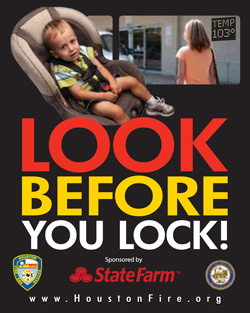Houston Fire Department
Heat Related Illness
HFD stresses the importance of taking safety measures when outdoors to avoid heat-related medical emergencies.
Before conducting outdoors activities and feeling thirsty, drink plenty of water and electrolyte-replacement beverages. Avoid beverages or food sources with caffeine, alcohol or large amounts of sugar because these can actually result in the loss of body fluid.
Conduct outdoor work or exercise in the early morning or evening when it is cooler. Individuals unaccustomed to working or exercising in a hot environment need to start slowly and gradually increase heat exposure over several weeks. Take frequent breaks in the shade or in an air-conditioned facility.
A wide-brimmed, loose-fitting hat that allows ventilation helps prevent sunburn and heat-related emergencies. A tight-fitting baseball cap is not the best choice when conducting strenuous outdoors activities. Sunscreen also helps protect injury from the sun's rays and reduces the risk of sunburn.
Wear lightweight, light-colored, loose-fitting clothing that permits the evaporation of perspiration. Do not leave children, senior citizens or pets unattended in a vehicle. Heat cramps, heat exhaustion and heat stroke are the most common types of heat related emergencies.
Heat cramps are muscle pains or spasms that typically occur in the abdomen, arm, and legs in association with strenuous activity. If you have heart problems or are on a low sodium diet, get medical attention for heat cramps.
If medical attention is not necessary, take these steps:
- Stop all activity, and sit quietly in a cool place
- Drink clear juice or a sport drink
- Do not return to strenuous activity for a few hours until after the cramps subside because further exertion may lead to heat exhaustion or stroke.
- Seek medical attention for heat cramps if they do not subside in one hour.
Heat exhaustion is the body's response to an excessive loss of water and salt contained in sweat. Signs include profuse sweating, paleness, muscle cramps, weakness, dizziness, headache, nausea or vomiting, a weak-but-rapid pulse and fainting. The skin may be cool and moist. If heat exhaustion is untreated, it may progress to heat stroke.
Heat stroke occurs when the body's temperature rises rapidly, the sweating system fails, and the body is unable to cool down. Body temperature may rise to 106°F or higher within 10 to 15 minutes. Heat stroke can cause death or permanent disability if emergency treatment is not given. Heat stroke symptoms include an extremely high body temperature (above 103°F, orally), red, hot and dry skin (no sweating), rapid and strong pulse, throbbing headache, dizziness, nausea, confusion and unconsciousness.

More than 500 children have perished in the United States since 1998 due to being left or trapped in vehicles and from 2009 – 2011, the HFD has responded to nearly 100 children under 8 left in cars.
If anyone sees an unattended child in a car, they should call 911 and stay until help arrives.
National stats indicate that more than 50 percent of these children are just "forgotten" by their caregiver. Estella Olguin with CPS, recommends that parents and caregivers place your purse, phone, computer or wallet in the back seat as a reminder that you have your child in the car.
Caregivers can keep a stuffed animal in the car seat and when the child is put in the seat place the animal in the front with the driver. It is also recommended that parents have a plan with the childcare provider to call you if your child does not show up for school.
Children are also locked in hot cars are due to them playing in the car when it is parked. Citizens should always lock their car and ensure children do not have access to keys or remote entry devices and children should be taught that cars are not a place for place.
According to City of Houston EMS Physician Director/Public Health Authority Dr. David E. Persse, if children are trapped inside cars, it can result in heat exhaustion or heat stroke, leading to permanent disability or death in a matter of minutes. Heat stroke, also known as hyperthermia, can cause shock, seizures, irregular heartbeat, heart attack, and damage to the brain, liver and kidneys.
National Stats indicate that even on "mild" days or if the window is "cracked" the inside of a vehicle can reach nearly 120 degrees. And remember children are more sensitive to heat, causing heat stroke.

